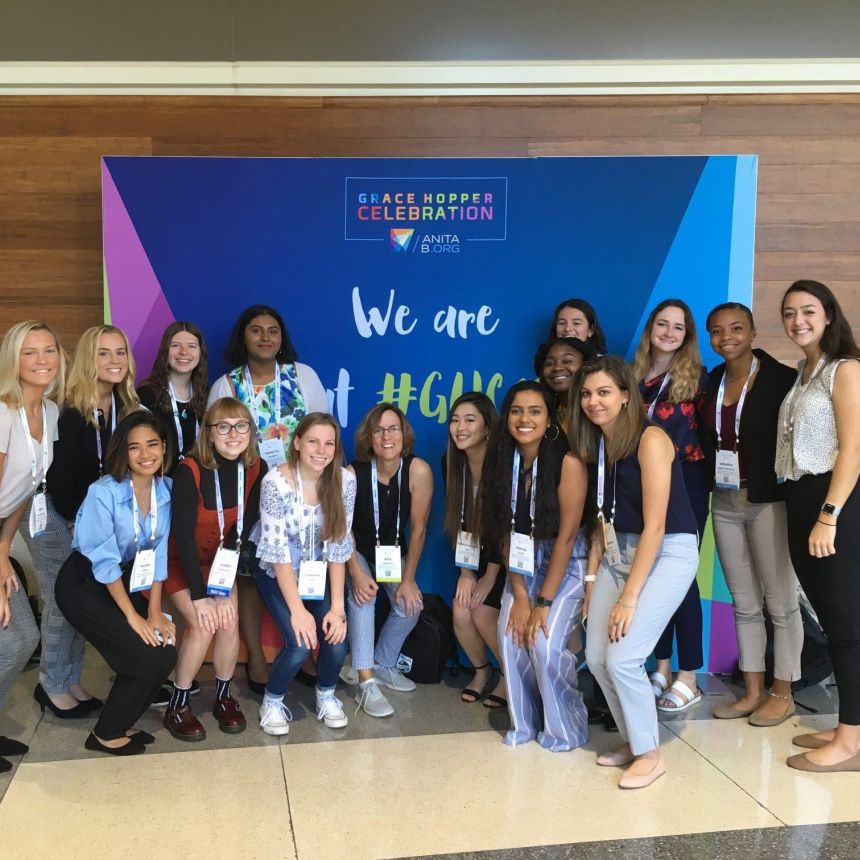
B.S., Information Technology Ethics and Compliance
Technologies are not neutral tools.
They are political, have unintended consequences, and carry embedded values. They advantage and disadvantage populations, impact individual behaviors, and shape society. The B.S., Information Technology Ethics and Compliance program positions you to understand technology's impact on society and maximize its positive effects. By understanding how history, politics, culture, and context shape our interactions, you can guide the creation and use of technology toward fair, just, and ethical outcomes.
Is Information Technology Ethics and Compliance Right for Me?
IEC combines technology with law and policy, business, sociology, and education to understand how technology impacts people, organizations, and society. This program could be a great fit if you want to
- help people and organizations use technologies in meaningful ways
- think strategically to ensure technology is used ethically and is compliant with regulations
- navigate complex sociotechnical systems and advocate for justice, equity, and the public good
- enroll in law school or graduate degree programs at the intersection of technology and ethics, such as public policy or science and technology studies

What You'll Study
Gain foundational knowledge and state-of-the-art skills needed to drive IT solutions that improve the way people live, work, and communicate by exploring topics like these.
- Social Implications of Information Technology Design
- Emerging Technologies in Pop Culture
- Ethics of Leadership or Technology
- Socially Responsible Information Management
- Ethical Issues in Data Science Practice
- Legal and Regulatory Environment of Privacy and Security
- IT Project Management
- Informatics, Risk, and the Post-Modern World
- Decision Theory and Analysis
Application Focus Areas
Pick an application focus area or work with an adviser to create your own to gain context for where you will do your work.
- Business Competency
- Cybersecurity Analytics and Operations
- Ethics and Sustainability
- Health Care
- Human-Centered Design and Development
- Law and Policy
- Organizational Leadership (World Campus)
- ROTC
- Security and Risk Analysis
- Custom Application Focus

The Power of Internships
Every Information Technology Ethics and Compliance student must complete at least one internship before graduating—most complete more than one, and 84% receive a job offer from an internship provider. With hundreds of organizations recruiting and a dedicated Career Solutions team to support you, you'll have the tools and opportunities to launch your career.
View Past Internships
“As technology becomes embedded into everyday aspects of life, the need for ethical, thoughtful and socially responsible leadership in information technology has never been greater. From artificial intelligence and data analytics to digital surveillance and cybersecurity, today’s most urgent challenges are as much about people and power as they are about code.”
Andrea Tapia , Dean
Discover Your Career
Technology is ever-changing, and so are the careers that create, use, and study it. As you work toward your degree, you’ll identify and refine your career interests through courses, student organizations, and experiential opportunities. With guidance and resources from our dedicated Career Solutions team—from your first job to the executive suite—you'll gain the technical expertise, business savvy, and communication skills to lead in business, health care, defense, technology, and countless other industries.
Ethics and Compliance Officer
Ensures ethical use of IT systems, data, and processes by aligning with laws, regulations, standards, and policies to protect the organization’s reputation and mitigate legal risks.
IT Specialist
Specializes in areas like programming, networks, internet, web design, or mobile computing, adapting to new technologies and trends as they emerge in each field.
Technology Advisor
Provides expert advice and detailed information in a specialized field, guiding organizations to ensure safe, effective practices and informed decision-making in complex or high-risk scenarios.
Data Governance Specialist
Creates policies and strategies for managing data across systems, ensuring compliance, improving data quality, and securing data in complex distributed environments.
IT Project Manager
Coordinates cross-functional teams to manage technology projects, overseeing planning, execution, monitoring, and closure. Expert in Agile, Waterfall, and project tracking tools, with strategic insight into organizational impact.
IT Auditor
Evaluates IT infrastructure to ensure effectiveness, security, and compliance, identifying vulnerabilities, assessing risks, and recommending improvements to strengthen controls and mitigate threats.
Security Operations Center Analyst
Secures, monitors, responds to incidents, recovers systems, remediates issues, ensures compliance, and coordinates activities to maintain security and system integrity.
Business Systems Analyst/Consultant
Analyzes business problems and designs technology solutions, bridging gaps through architecture, tools, or software applications to resolve issues and improve processes.
Cybersecurity GRC (Governance, Risk, and Compliance) Consultant
Enhances cybersecurity by focusing on governance, risk management, and compliance, developing policies, mitigating risks, and ensuring adherence to industry standards and regulations.

Diversity in Computing Conferences
Through mentored research, student organizations, and experiential learning opportunities like attending the Grace Hopper Celebration and ACM Richard Tapia Celebration, Information Technology Ethics and Compliance students can extend learning far beyond the classroom. These professional conferences connect students with industry leaders to celebrate the power of diversity and computing and emphasize the importance of designing technology that advance fairness, equity, and justice.
